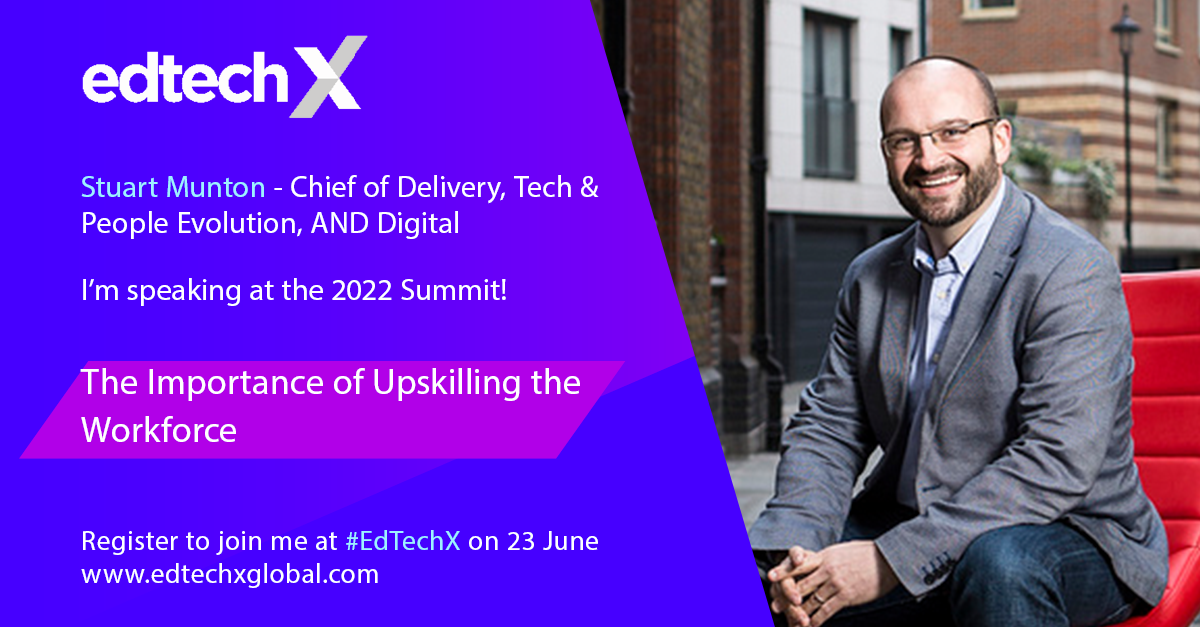News
EdTech Q&A with Stuart Munton - Chief of Delivery at AND Digital
16 May 2022 • 4 min read

London EdTech Week launches on 20 June. This year it will be particularly important as the shape of education in our post-pandemic world begins to emerge. This year, AND Digital's Chief of Delivery, Tech and People Evolution, Stuart Munton, will be talking about the importance of upskilling in the workplace at an event on 23 June. To get a little taste of that talk and EdTech Week more generally, we spoke to Stuart who gave us his insight into this important trend.
Hi Stuart! Thanks for taking the time to chat. What is EdTech? — How broad is the concept? Is it just about the learning process or also about institutional operations?
EdTech started as a set of platforms and tools to share learning content, however the COVID pandemic showed us that it could be much more. There is now a global movement to digitise and expansively share knowledge that is powered by EdTech. This covers the learning process and the institutions for sure, but also expands into expert user generated content and helps to bridge the digital skills gap at scale.
I am so excited about the current state of EdTech, and fascinated by the opportunities it will provide in the future.
How important has EdTech been through the pandemic? What are some good examples in recent years that people might have missed?
You only need to look at the rapid uptake of platforms such as Google Classroom. This moved from a ‘nice to have’ tool to a ‘primary learning platform’ in a matter of weeks.
Educators around the world who were already using the platform were at a great advantage. I saw first hand how my wife (who teaches art in schools) took to the platform so that she could provide creative, engaging, and interactive sessions for her pupils - with some outstanding results.
What are the advantages of EdTech? How can we be sure that the advantages are for those learning, not just for companies delivering platforms and solutions?
EdTech provides such a wider access to content and knowledge than ever before. We have world class course from organisations such as Google’s AI courses that are now available to all people who have an internet connection. (While this is so much wider than before, we still need to note there are limits here still.)
The historic need to be in a specific location for learning have largely been removed. Clearly, we have had innovators in this space such as the Open University for decades, but now just about every other learning institution has needed to participate as face-to-face becomes less and less critical.
As with any progress, there is a balance between the benefits to the user and the provider. We can see a range of different offerings from ‘Fully Free’ to ‘Full Paid’ platforms. It is this scope that now allows people to engage from where ever they are, with low (or zero) cost barriers to entry.
Is EdTech just about education for young people (ie. at school)? How can it help learning and education in other domains and for people at different stages of their lives?
There is a focus on all ages and sectors in EdTech. Historically we associated learning as something that occurs at a younger age, and while this is still highly important, EdTech platforms allow wider and more open access to everyone. We see content aimed at career changers, people returning to work, people coming from socially excluded spaces... This is where EdTech is making great progress and proving socially valuable.
To what extent does EdTech shape pedagogical practices? Is there a danger that practice becomes secondary to technology?
Interesting question… I consider it as an iterative loop, where the changes in our ‘tools’ can provide opportunity for change in our ‘practices.’ In turn, this fuels more change in our ‘tools’. This is an evolutionary cycle - the changes that are beneficial will succeed; those that are not will fall to the wayside.
One saying that comes to mind is “if you always do what you always did, you will always get what you always got…”
How should public institutions approach EdTech? What do they need to consider?
All organisations (public or otherwise) should consider user needs first. Decisions that are based on user-centred design and understanding are critical to the approach to EdTech.
The range of EdTech platforms is wide and growing; some are targeted at particular sectors, some are more open. That means you need to consider your users' needs in the current, near, and far time frames.
You need room to grow, but you also don’t want to purchase more than you want to actually use.
What about privacy risks? Can EdTech companies be trusted with educational data? What can be done to build trust and transparency?
We now live in a world where our personal information resides in hundreds of locations across the digital world. I personally believe that EdTech companies will be doing their very best to maintain privacy and security, because the implications of them not doing so is so damaging to their brands.
However - it is worth noting an old adage that “You don’t get anything for free” - by this I mean that you must understand the potential privacy differences you could experience across the range of EdTech platforms depending on your contractual engagement.
Thanks for your time Stuart!
If you're heading to EdTech Week, you can hear Stuart speak on Thursday 23 June at EdTech Summit.



